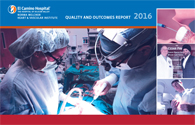Prepare for a Heart Surgery
Make sure you review our registration and admissions information so you’re prepared well in advance of your procedure. This includes information about what to bring to the hospital (if your procedure requires hospitalization), as well as some conveniences to make registration easier.
Presurgical Appointments
Your surgeon’s office will coordinate exams and testing before your procedure, which will require several appointments, including a physical exam.
Physical Exam
A nurse practitioner or physicians assistant will examine you. Please bring all your medicine, in the original containers, to the appointment.
During the appointment:
- A nurse will discuss your upcoming procedure and explain what happens before, during and after, including what monitoring devices and medical equipment are used — such as a ventilator, tubes and lines used after open-heart surgery.
- You’ll undergo lab work, a urine test, a chest X-ray, an >EKG and a carotid ultrasound.
Blood Type and Crossmatch
Two to seven days before your procedure, you’ll need to have blood drawn at the lab at El Camino Health. The blood test will determine your blood type and crossmatch, which ensures you receive the correct type of blood if you require a blood transfusion.
Advance Preparations
It’s important to be in the best possible health before your procedure. There are a number of things you should do to prepare and protect your health:
- Get insurance authorization. Our patient registration department will obtain insurance authorization. Please call your insurance provider to determine your financial responsibility.
- Make sure you have an advance healthcare directive. This important document communicates your healthcare preferences if you’re unable to express your wishes. You should bring your advance healthcare directive with you to the hospital.
- Stop smoking. It’s mandatory to stop smoking before your surgery — the sooner, the better. Smoking irritates your lungs and can affect the amount of oxygen you receive, which is important for healing. If your lungs aren’t in top shape, it can take you longer to recover. We offer programs to help you quit.
- Report new health problems. Let your doctor’s office know immediately if you have any new health problems — such as a fever, cold symptoms, a cough or a urinary tract infection — or if you’ve started taking antibiotics. As your surgery date approaches, avoid contact with people who are sick.
- Discontinue medicines. Seven days before your surgery, you should stop taking blood thinners and over-the-counter supplements, such as fish oil, ginseng, gingko biloba and vitamin E. It’s safe to take up to 81 milligrams of aspirin a day, including the night before the procedure.
- Practice sternal (breastbone) precautions. After open-heart surgery, you won’t be able to lift, push or pull more than 10 pounds (a gallon of milk is 8.4 pounds) for four weeks while your breastbone heals. It can take up to eight weeks to heal completely. Practice getting out of bed and up from a chair without using your arms.
The Night Before Surgery
Set aside the items you plan to bring to the hospital (pack lightly, as there’s little storage in the unit). Plan to wear comfortable clothes — you’ll wear this same outfit home. We recommend wearing a shirt that buttons or zips in front.
Shower and Antiseptic Wipe Instructions
Bacteria live on your skin and don’t normally pose any risk, but they can lead to infection in surgical incisions. That’s why it’s so important to shower and wipe your skin with antiseptic wipes (provided at your pre-procedure appointment) to prevent infection.
Shower with regular bath soap and rinse off completely. Don’t shave anywhere on your body, and don’t apply any lotion. If you’re wearing nail polish, remove it before your shower.
An hour after your shower, use the antiseptic cloths. Use one cloth for each area in the following order:
- Chest
- Back
- Right arm (including armpit)
- Left arm (including armpit)
- Right leg (front and back)
- Left leg (front and back)
Allow the area to air dry for a minute; don’t rinse. Your skin may feel mildly itchy or turn red temporarily. If itching or redness persists, rinse the affected areas. Throw the wipes in the trash when you’re finished (they’re not flushable).
Dress in clean sleepwear after your skin dries, and sleep on freshly laundered sheets. Don’t take a shower the morning of your procedure.
Oral Hygiene
You’ll receive two antiseptic rinses at your pre-procedure exam: one for the night before your procedure, and one for the morning. The night before, brush your teeth and gargle with the provided rinse, then spit. If you wear dentures or partials, don’t put them in once you’ve used the rinse. Do the same in the morning before you leave for the hospital.
Eating and Drinking
Don’t eat or drink anything, including water, after midnight the night before your procedure. If you were told to take medicine the morning of the procedure, take it with a small sip of water.
Find out what to expect the day of open-heart surgery. If you’re having a minimally invasive heart procedure, learn how to prepare.
